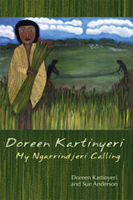Doreen Kartinyeri: My Ngarrindjeri calling
Summary
‘Lies, Lies, Lies’ shouted the newspaper headlines following the Royal Commission decision into building the Hindmarsh Island Bridge. Doreen Kartinyeri, key Ngarrindjeri spokeswoman, was devastated. How could whitefella law fail to protect Aboriginal women’s sites? Against a backdrop of abuse, threats and ill-health, Doreen fought back. In 2001 the HREOC Inquiry vindicated the women.
Aged 10 years, Doreen suffered the loss of her mother, her sister’s removal and her own placement in Fullarton Girls Home, 100 kms from home. Doreen later learnt about her culture from her Aunty Rosie and other women with whom she spent time. She had nine children of her own and fostered 23 others.
Although poorly schooled in formal terms, Doreen was a tenacious researcher. Her sharp memory allowed her to piece together histories and genealogies and she helped reunite members of the Stolen Generations.
Doreen was a female warrior, dedicated to upholding and protecting Ngarrindjeri law. In My Ngarrindjeri Calling Doreen Kartinyeri reveals a deep-set desire for social justice, fuelled by passionate love and anger. Her wit and humour abound, while her integrity and sense of justice are inspirational.
Doreen Kartinyeri established the Aboriginal Family History Unit at the SA Museum, was awarded an honorary doctorate and published several books of genealogy. She passed away in December 2007.
Sue Anderson has worked as a cultural heritage consultant and oral historian for many years, producing many articles and publications.
Reviews and endorsements
'This book is a rich and rewarding read, which is sometimes startling in the honesty Doreen brings to recollections of her interactions with colleagues, family and friends and those she fought, or the people she felt had betrayed her. At times there’s more details about important events (such as the Kumarangk bridge business), than I was able to absorb or make sense of, because of Doreen’s intensely personal, insider perspective. At the same time it’s worth acknowledging this detailed information will be a treasure trove for future research.
It’s the compelling story of an Aboriginal woman who is determined to put her experiences on the record and to remain true to her life’s vocation of foregrounding the perspectives, knowledge and ancient wisdom of Aboriginal people and challenging the dominance of white Australian history.'
— Catherine Murphy, Mouth to Page, Bulletin of the International Oral History Association, Vol. 17, 1 January 2009
Information about purchasing ASP’s ebooks.
